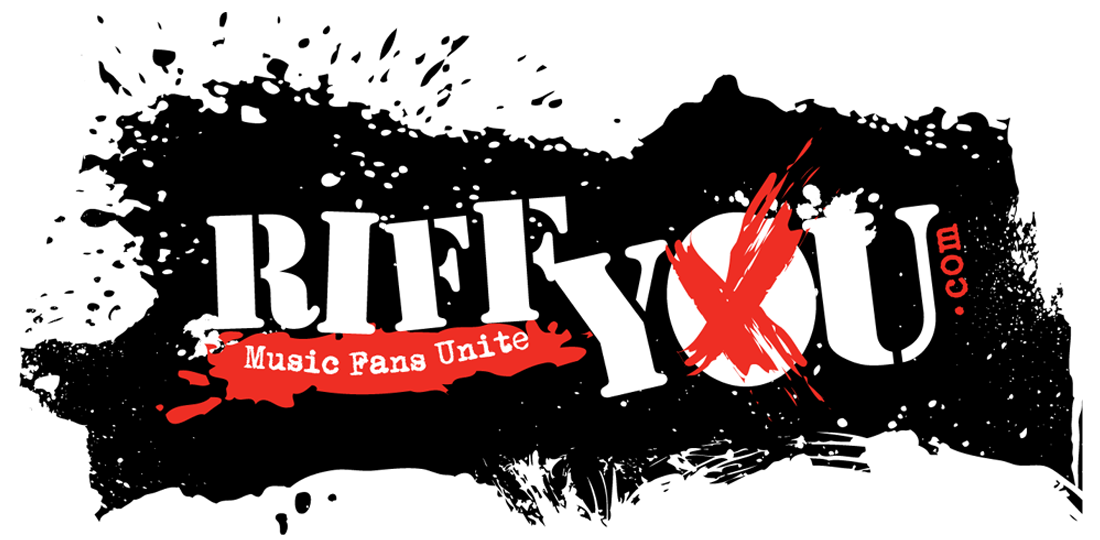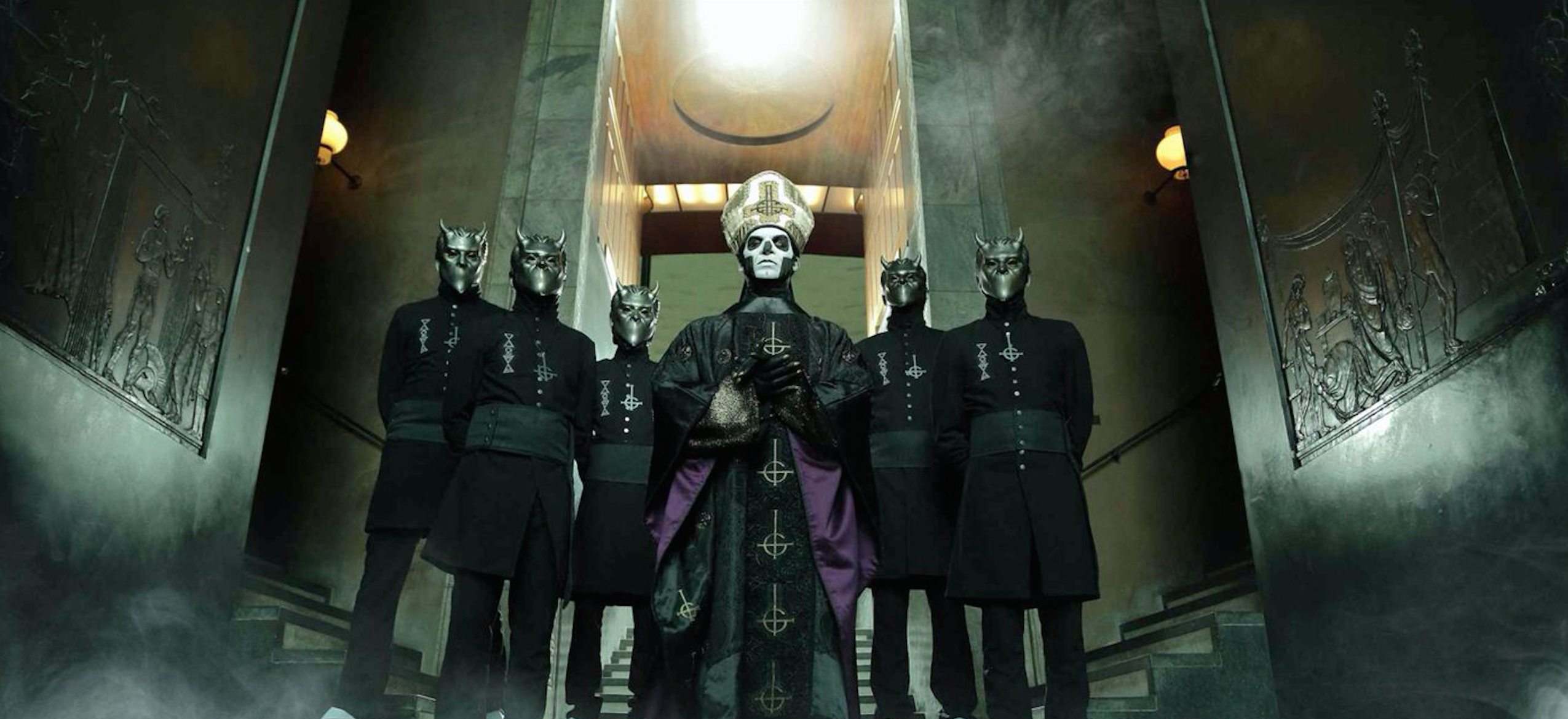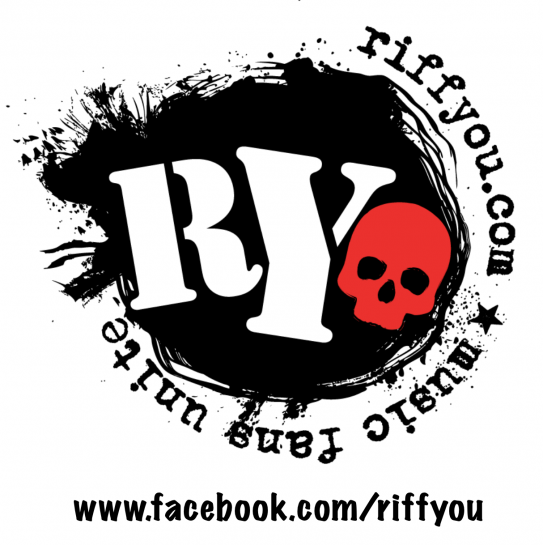Q+A: GHOST Come to Grips with its Identity
There’s not a lot of mystery in music nowadays, but Swedish theatrical metal act GHOST is one of the few bands that has chosen to keep the identities of its membership a firm secret.
Instead, audiences have one anonymous lead singer, Papa Emeritus III, alongside a collection of musicians known only as Nameless Ghouls. Together, GHOST has put out a trio of albums that take the metal aesthetic and blend it with pop-sensibilities and many outside-of-shred influences.
Riffyou.com spent time with one of the Nameless Ghouls to get a greater insight on GHOST’s third album, Meliora, as well as how the band continues to polarize others with its tough-to-nail-decipher image.
RY: With Meliora, what type of artistic growth was GHOST hoping to achieve?
Nameless Ghoul: “We were very determined going into the process of making this album to have it more muscly. The previous album came out in a way that was unintentionally lightweight. It was never the idea to make it sound lightweight, but it was a last minute mistake and negligence that wound up happening…because we were so close to a deadline and we weren’t in the room. [With Meliora] we were determined not to make that mistake again. From that point of view, we definitely accomplished what we wanted, because we made the album with more feistiness, and bite. We wanted our new album to sound more like Kiss Alive and I think we achieved that.”
RY: GHOST is really good at blending that metal edge with pop sensibilities. How important is it for the band to travel such different creative avenues?
Nameless Ghoul: “We listen to such more than just metal. As much as I appreciate a really, really nasty death metal album from 1986, I also like a pop album from 1964, or a soul single from the early ‘70s. So, we don’t limit ourselves musically. I think we have found a recipe where we can freestyle a lot and combine things that, for us, is quite natural because we listen to so many different things. We find new ways to express ourselves, even though it’s a language we already know. We always try to create new songs that we don’t have, rather than duplicating ‘Ritual,’ ‘Year Zero,’ or so on. One of the problems with many contemporary metal bands – all of these ‘sentence for a name’ bands – is that they grew up on ‘way too late music’ and they keep listening to the same things they want to sound like. So, they grew up listening to nu-metal, then they create nu-metal, therefore it’s just regurgitated nu-metal. Then [these bands] call it emo-core, death-core, or whatever. It’s all the same thing that never gets anywhere, because they look too much into the naval of certain bands.”
RY: Considering how much you embrace non-metal influence, how do those in the metal community react to GHOST?
Nameless Ghoul: “Ever since we made our first album, the one word we’ve heard the most – apart from Blue Oyster Cult – is polarization. And, it is usually 50/50. With the die-hard metal fans, you never know. I come from the underground metal scene, so I have a lot of friends who are old in the game and the most respected dudes in the community. And, you never know. Sometimes you’ll have a guy that you’d bet money on him hating our new album, and then all-of-a-sudden that person raves about the album and wishes for the band to get bigger. Then you have the sidekick who loved the albums so far, then trashes the band and claims we sold out forever and betrayed the metal scene. I’m not too bothered. I know my friends and I know what I like and what GHOST is good at. If that’s metal or not metal…I can’t waste time on that thought.”
RY: Have people begun to stop trying to figure out who you guys are behind the masks?
Nameless Ghoul: “On tour, it’s a little more arbitrary. Obviously, if there are one thousand people at a show, there are not going to be a thousand people waiting for us to come out. So, not everyone cares to know. I would assume that for some people, we are just that spectacle that they chose to go to and they might not be completely sold on the band, but they like the entertainment aspect of that. That’s part of going from being a small band to a slightly bigger band – all-of-a-sudden there are not just 200 people who actually give everything for the band. You can have a really big concert with 7,000 people in an arena and know not everyone is a collector. But, if you have a thousand people, there might be one hundred people waiting outside. And sooner or later, we have to come out, because we have to go to our bus to leave. We’ve been trying to communicate to everybody that whatever you find online or whatever you do or do not know, if you do not want to know who we are, don’t stand by our bus. If you’re afraid that something might be ruined, don’t wait. We promise to do our band officially in masks, but when we come out from our jobs and we are civil and private, you leave us as we are. Most people are cool with that. On tour, though, we don’t feel that anonymous anymore.”
RY: Has GHOST ever thought about moving on from the masks and letting your identities be known?
Nameless Ghoul: “We’ve toyed with that idea, but have always come to the same conclusion: as long as we keep everything as GHOST, masked, we should be cool. The reality is that this might not be something we do forever. One achievement more bands should try for is to know when to quit…when they are not important anymore. Sooner or later, that day will come [for us] and I hope we are aware and awake enough to notice that we are becoming a routine and reach a point of irrelevance. Obviously, the next band we start individually will not be a masked, horror-rock band. So there will always be the possibility that if GHOST hangs it up, we might become another band…and that won’t be masked. If that is ruining it, I don’t know. We are not there yet, so I can’t tell. I’d like to think that as long as we don’t stain GHOST and take our masks off on stage and continue to embrace the theatre of it, we’ll be fine.”
-Adam Grant
Please be sure to follow us on Twitter @riffyou and at Facebook.com/riffyou.


































